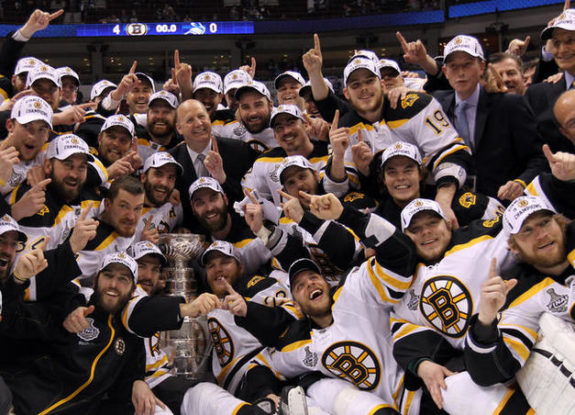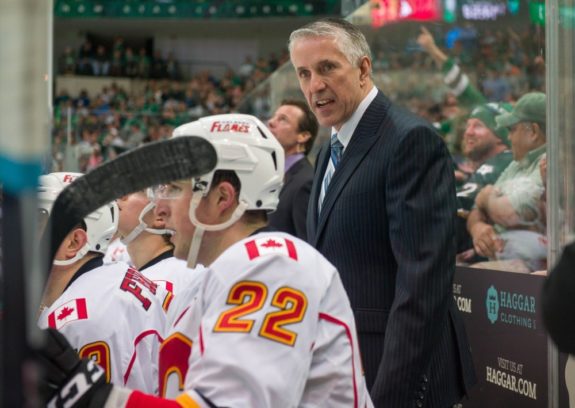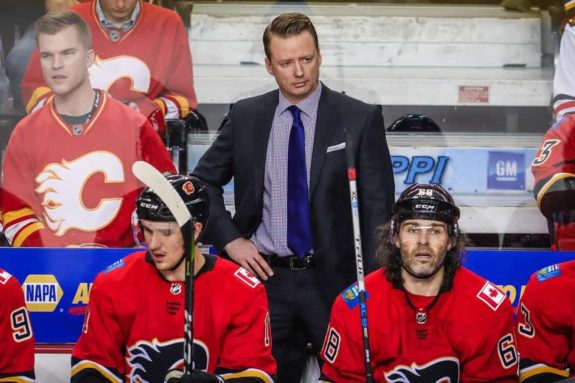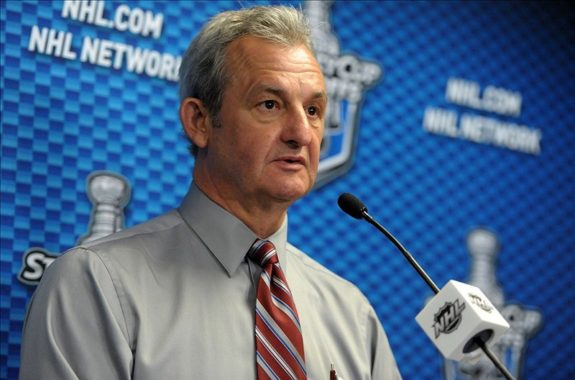A new era has begun in Calgary, after Geoff Ward was officially named as the interim head coach of the Calgary Flames. It was announced on Friday (Nov. 29) that former head coach Bill Peters had tendered his resignation following a week-long investigation into allegations of misconduct that were made via Twitter by a former American Hockey League player from a decade ago.
It most likely wasn’t the way Ward imagined he would earn his first head coaching role in the NHL, but regardless, it’s his time now. It’s his team now. He started off strong, picking up his first win as an NHL head coach against the Buffalo Sabres on Nov. 27, 2019.
The New Bench Boss
Ward is now manning the helm in Peters’ wake, which leaves many hoping he may just be the right fit. He knows the group already, has the respect from the players and he does have plenty of head coaching experience, albeit just one game officially in the NHL.
Ward was the head coach of the Kitchener Rangers (Ontario Hockey League) from 1994-95 to 1997-98 and later in his career won the Louis A.R. Pierre Memorial Award for Most Outstanding Coach in 2002, after assuming head coach duties with the Hamilton Bulldogs (AHL) and taking the team to a Calder Cup Final appearance. He has been an assistant coach in the NHL for the Boston Bruins and New Jersey Devils, winning a Stanley Cup with the Bruins in 2011. He has the credentials and the familiarity with the group, which can be beneficial in a midseason shakeup such as this.

Assistant general manager Craig Conroy and assistant coach Martin Gelinas — who is usually running his operation above the ice during games — will both be on the bench as assistant coaches for the Flames moving forward. Ryan Huska will retain his position as an assistant coach as well.
As a former elementary school teacher, Ward knows how to instruct younger generations. He is rarely seen without a smile on his face and is always finding ways to keep things positive. He and his coaching staff are already thinking of innovative ways to inject some positive energy and fun back into this Flames group, which was evident right away, as classic rock songs like ‘Tiny Dancer’ and ‘Radio Ga-Ga’ blared on the arena sound system as the team took to the ice for their first ‘post-Peters’ practice.
Everything feels better when you’re having fun, even for pro hockey players, and it seems that instilling a bit of good energy into his players is the first step in getting this Flames team out of the doldrums it has found itself in to begin this season.
Different Coaches, Similar Results
Ward will be the fourth Flames head coach in the last eight seasons. While each of the last three coaches had varying degrees of success during their tenures, all three failed to achieve the main objective for the Flames, which is ultimately to win a Stanley Cup.
Bob Hartley was bench boss from 2012-2016 and as the coach of the ‘Find-a-Way

Harley’s replacement was Glen Gulutzan (2016-2018) and was a far cry from the strict, no-nonsense approach of his predecessor. He was hailed to be a coach who knew how to reach the new generation of players. While Hartley may have ‘lost the room’ based on his old-school tactics, Gulutzan was said to be a better communicator and was expected to be able to relate to players, on their level.
He strung together an (82-68-14) record as the Flames head coach and made the playoffs in his first season, only to be let go the next year after the team finished just two games above .500 and missed the playoffs. The narrative surrounding the layoff being that Gulutzan was perhaps too soft and too ‘buddy-buddy’ with his team to really effect change within the dressing room.
Peters was then hired and was hailed as a hybrid of the former two. He was the only coach that Treliving interviewed for the job — which begs the question, what is next for Treliving? Peters is a protégé of the Mike Babcock school of coaching, spending three years as an assistant coach under Babcock in Detroit (2011-2014).
He utilized an old-school approach, with Carolina and Calgary, but balanced that by also demonstrating an ability to coach ‘today’s player’. He had success internationally with younger players, capturing gold as head coach with the Canada Men’s National U-18 in 2008 and later winning gold as head coach of Team Canada during the 2016 IIHF World Junior Championships. In his first, and only, full season in Calgary, Peters led the Flames to a 107-point season in 2018-19 and a Western Conference banner.
A New Era in Coaching
The Flames have gone through two coaches in the last three seasons and are now on to their next bench boss. So, what are the coaching qualities they should be hoping for? Akin to Goldilocks and the Three Bears deciding on porridge, the Flames need that ‘just right’ coach that can help mediate the temperature of a team that has been too cold on the ice this season, and too incendiary off of it. It’s a Flames team that, even prior to the Peters debacle,

Being ‘dictatorial’ didn’t work well for Hartley, being ‘friends’ didn’t work for Gulutzan and, clearly, Peters’ approach was not an overly effective one. When looking back on former Flames coaches, it appears that, at least in Calgary, the grizzled and blunt approach has had the best success in terms of winning hockey games.
A Flames Coaching Style Guide
When looking at former Flames coaches and their respective winning percentages, names like Mike Keenan (.585), Darryl Sutter (.581), Brent Sutter (.557) and Jim Playfair (.524) stand out on top. They were the last four head coaches in Calgary prior to Hartley. Each of those four coaches recorded the highest winning percentages among any Flames coach in the last 25 years. (Dave King recorded a .576 winning percentage from 1992-95).
None of the four coaches listed would be considered ‘new school’ or ‘progressive’ or ‘sensitive’ or ‘politically correct’ in terms of their coaching approach. However, by the numbers, they were fairly effective coaches in Calgary and elsewhere throughout their careers.
(Darryl) Sutter led the Flames to Game 7 of the Stanley Cup Final (2003-04) and later won two Stanley Cups with the Los Angeles Kings (2011-12, 2013-14). Mike Keenan won a Stanley Cup with the New York Rangers in 1993-94 and currently sits eighth all-time in NHL wins with 672. However, the ‘my way or the highway’ style of coaching seems to have phased itself out, or at least the transition has now begun throughout the NHL.

A lot has changed in society in the last 25 years. A lot has changed in hockey during that time, as well. What worked in the past is not necessarily effective today and what was perhaps once deemed as acceptable conduct within a hockey context over the past two decades, does not necessarily translate to today’s hockey player or fit with the culture the NHL is hoping to create.
Coaches will need to be well-versed in dealing with this new era of players, dealing with the advancing forms of media and exploring the new cultural ideologies that go with it. A successful coach in the NHL should be able to navigate the latest cultural waters, yet still be an effective motivator, teacher and leader of men; men who go to battle every night playing a high-paced, aggressive, contact sport like hockey.